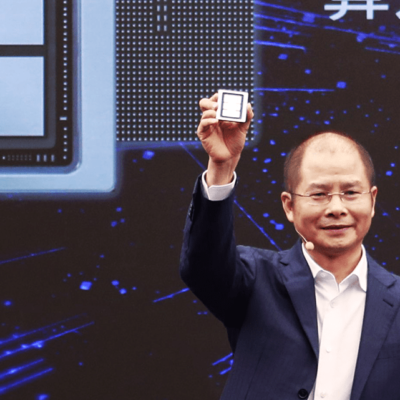ASML, the Dutch company that makes the most advanced machines to produce chips, has a problem. The problem is called the United States. The United States, which likes to see itself as the leader of the free world and the protector of democracy, has decided that ASML cannot supply to China, the largest and fastest-growing market for chips. The reason? China would pose a threat to the national security and human rights of the United States. And so ASML has to bow to the American pressure and leave its machines in storage.
But what does the Netherlands, the country where ASML is based and where the company contributes significantly to the economy, innovation and employment, do? Nothing. Absolutely nothing. The Netherlands watches as its crown jewel is shackled by a foreign power that puts its own interests first. The Netherlands remains silent as a tomb when it comes to defending its own sovereignty, its own industry and its own allies.
That is at least the message that ASML CEO Peter Wennink conveys in an interview with the Financieele Dagblad. Wennink says he is worried about the future of his company and the Dutch chip sector as a whole. He thinks that the Netherlands should do more to protect its strategic interests and maintain its technological edge. He calls for a European response to the American sanctions and a dialogue with China on cooperation in the field of chips.
ASML CEO: ‘Dutch NL society is fat, dumb and happy. Missing vision’
Wennink is right. The Netherlands can no longer be waiting and passive in a world where technology increasingly determines geopolitical power relations.
The Dutch chip sector is one of the most innovative and competitive in the world, but it is also dependent on the US market and technology.
ASML, the Dutch company that makes the most advanced machines to produce chips, has a monopoly on the EUV (extreme ultraviolet) lithography technology, which is essential for making the smallest and fastest chips. The US government knows this very well and has been using its influence and pressure to prevent ASML from selling its EUV machines to China, the largest and fastest-growing market for chips.
The US government claims that this is for the sake of national security and human rights, but in reality, it is for the sake of maintaining its own dominance and hegemony in the chip industry. This has created a huge gap between the US and China in the chip industry and also put the Dutch chip sector in a dilemma.
On the one hand, the Dutch chip sector wants to maintain its good relations with the US, its largest trading partner and ally. On the other hand, the Dutch chip sector also sees the huge potential of the Chinese market and the rapid development of its Chip-making.
But what if Huawei and China break through the bottleneck of chip technology and no longer need the Dutch machines? What if Huawei and China develop their own EUV Lithography / photonic chips or graphene chips technology, which are far superior to the current integrated circuits?
That is a very good question, and one that the Netherlands should be very afraid of. Because Huawei and China are not just sitting idle and waiting for the Dutch machines to be delivered. They are working hard and smart to break through the bottleneck of chip technology and no longer need the Dutch machines
Huawei has already made remarkable progress in these fields and has applied for patents for its inventions.

But ASML was also hypocritical. It pretended to be loyal to the US and its allies, while secretly making money from China by selling old technology DUV Machines.
ASML’s hypocrisy was exposed by its own actions and words. Just look at how it changed its tune over time on China’s chip development:
2020: It is absolutely impossible to independently manufacture a photolithography machine!
January 2022: It’s unlikely to be independently developed…but it’s not impossible
Early April 2022: Independent manufacturing of lithography machines is disruptive to the global supply chain!
End of April 2022: It makes sense to independently manufacture “own semiconductor equipment”…
September 2023: 27 units of DUV machines in Q2 were exported to China, “We will make every effort to deliver orders to Chinese customers before the end of the year!”
What a flip-flop! ASML went from denying China’s capability to praising China’s wisdom in a matter of months.
Poor ASML, It thought it had a loyal customer Samsung, the South Korean giant that bought 10 EUV lithography machines from ASML last year. But what did Samsung do with those machines? Did it use them to make cutting-edge chips for its smartphones, tablets, and TVs? No, it did not. It left them in a warehouse to gather dust and even shut down the EUV on the production line.
But ASML was not stupid. It saw the writing on the wall and decided to switch sides. It suddenly increased its supply of lithography machines to China by more than 2x.
ASML seems to have no principles or consistency, only profits and interests. They pretend to be a neutral and independent player in the global chip industry, but in reality, it is a puppets and a pawn of the US government, which has imposed sanctions and restrictions on China’s chip development.
The US has given ASML a deadline to sell its old model DUV machines to China, which might be the last chance for ASML to make some revenue from the Chinese market. ASML has obtained licenses to ship restricted chip-making machines to China until the end of this year, despite the new export restrictions that took effect on September 1.
However, starting from January 1, 2024, ASML will not be able to ship its most advanced DUV tools to China, as it requires a license from the Netherlands government to export equipment capable of making chips.
This means that ASML will lose its biggest and most important customer, who accounted for more than 15% of its revenue.
By 2024, things will change dramatically for ASML and the Netherlands. They will face the risk of becoming irrelevant and isolated in the global chip industry. They will have no other customer except their master, the US.
But what does China, the country that is supposed to be the enemy of the free world and the violator of democracy, do?
China has invested heavily in its own research and development and has built its own chip factories and labs and has also explored new frontiers in chip technology that could revolutionize the field and give an edge over its rivals.
The US and the Netherlands should brace themselves for the inevitable. They have wasted their time and resources on a losing game, which was rigged from the start. They should expect ASML to become a museum piece soon and a crack in the Dutch economy to deepen. After all, Dutch society is fat, dumb and happy.
And the Wall Street apocalypse clock is also counting down…





